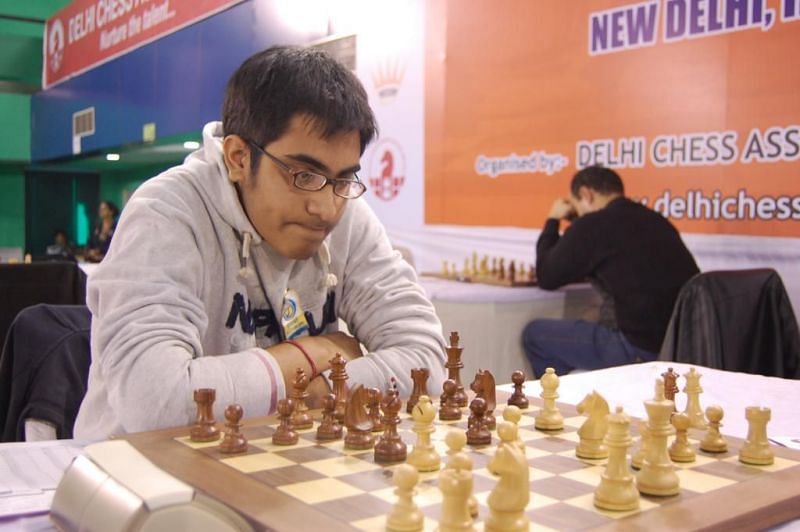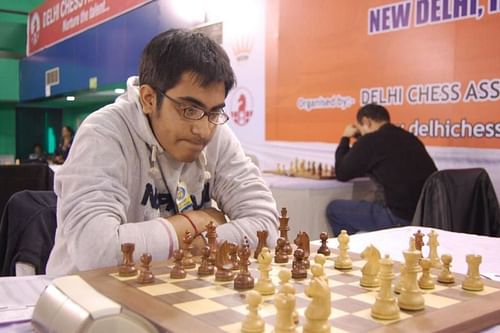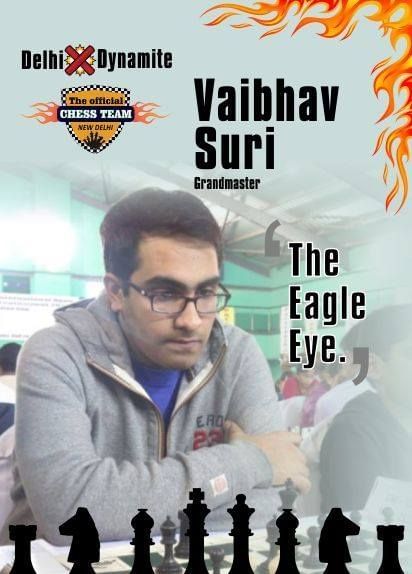
Vaibhav Suri: Chess and Education go hand-in-hand for this Grandmaster
How many of us have become a Grandmaster at 15, finished high school, and graduated from college at 19-20? Well, the answer is a bare minimum. However, Delhi's Vaibhav Suri has defied the odds and has accomplished this remarkable feat. He became one of the world's youngest GMs in 2012, at the same age when the legend Bobby Fischer became one. He graduated from two highly prestigious institutions in New Delhi namely- Modern School, Barakhamba Road and the Sri Ram College of Commerce(SRCC). It is, thus, fitting to catch up with this dynamic master in this interview.
1. You became a Grandmaster at 15 and have moved up the ladder now. What are your next ambitions?
My main goal is to keep improving the level and quality of my games. I think it has gradually improved since I became a GM. There are a lot of "mini goals" but my main focus is improving the quality of my chess.
2. In recent times, you have had quite a few outstanding performances including this year’s Delhi Open. Can you please share with us some of your key achievements in the past few years.
I was quite happy with my play in the Reykjavik Open 2018. Delhi Open was quite decent as well though I did not increase much rating points. Last year I think my main achievements were the Silver Medal in Commonwealth 2017 and Bronze in Asian Indoor Games in Ashgabat, Turkmenistan.
3. How do you prepare before matches and what is your schedule like during a tournament, before a tournament, and after a tournament.
My training schedule is usually a mix of physical and intense chess training. Lately, I have started paying greater emphasis on analyzing games of top events in greater detail. During, the tournament - my prep usually involved some physical exercise and just rechecking my opening ideas and trying to understand how my opponent plays.
4. You recently graduated from college. (Vaibhav graduated in May 2018 from SRCC) Many chess pros do not consider the fact of getting an education from a university. What made you take up this challenge? Did it affect your performance in any way?
I was very clear from a young age that education plays a very important role in a person's life. My college was actually extremely diverse and that kind of exposes you to different worldviews. Actually, chess in itself is a great education. It teaches you a lot of things. Most of all I think it has helped me to discipline and create a structured thought process. To be honest, I understood the opportunity cost of taking admission back in 2015 but I was up for the challenge.
5. You played in the newly launched Brain duel chess open and won it convincingly. What are your thoughts about such tournaments?
So, what attracted me about BrainDuel was that it was a huge Mind-Sports festival. They had a couple of other events happening simultaneously like Poker and Bridge. So, I thought it would be interesting to play in a different environment.
6. You were also a part of the Delhi Dynamite PRO Chess League team. Can you share some of your experiences of being a part of the team for the last two seasons?
Pro Chess League is a great initiative by chess.com to create a global online chess league. Almost all the top players are a part of it and it provides an opportunity to play against some of those players. For example, this season I got to play against Magnus Carlsen in the group stage of the league. Delhi Dynamites has performed quite well in the 2 seasons. We've had a quite well-balanced team and this year with the addition of Harikrishna, our team has grown much stronger.
7. Which events have been your most memorable in chess and why?
Honestly, there are a lot of memorable moments. The tournament in Lille, France in which I scored my final GM norm is definitely one of the most memorable. However, I think there is one that stands out - so, back in 2007 I was playing an Asian Youth event in Al-Ain, UAE and I lost 4 games in a row which was quite painful. So, like a normal 10-year-old, I decided never to visit UAE and avoid playing age-group events as I was not playing as well in them as in Open events. So, moving forward to 2013- I got a chance to participate in World U-18 Championship again in Al-Ain, UAE. It was a difficult decision but one of the best in retrospect. I actually played quite well and finished 3rd. This whole experience taught me a very important thing - Never to let past events dictate your future decisions.
8. How do you plan your schedule for different tournaments?
I try to play in tournaments with as many strong players as possible. Also, I think it's important to play some official tournaments as well.

9. Do you do anything else to keep your brain ticking on the chessboard?
Physical Activity is an absolute necessity to be able to withstand long and intense games. You can't expect your brain to produce results if you're not in good shape.
10. Who has been your inspiration in your life and in chess?
So, I try to take different things from different players. I don't really have a specific person I look up to in chess. Everyone is kind of known for his/her own thing. Vishy Anand has always been one of the people I look up to. His knowledge and chess understanding is absolutely amazing. And in Life in general - Again, no one in particular. I just try to read a lot of books and try to get different ideas. If I still had to pick a name I would go with Charlie Munger.
11. Why do you think that playing chess is important?
Chess in itself is a great source of education. We're constantly learning and I have sort of always been able to relate chess with the "outside" world. Studying chess in a little detail and can actually pay huge dividends in terms of thinking ability even if you're not going professional.
